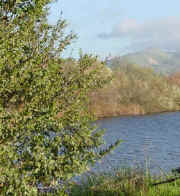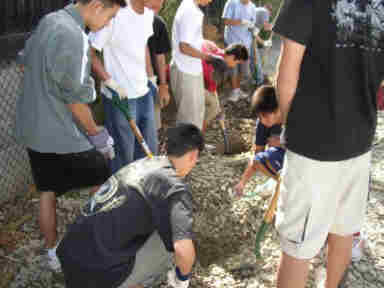 INTERN
OPPORTUNITY
INTERN
OPPORTUNITY INTERN
OPPORTUNITY
INTERN
OPPORTUNITY
Wetland Restoration Program
for High School Students
Sponsored by:
Math Science Nucleus
Alameda County Flood Control and Conservation District
San Francisco Foundation
OVERVIEW
The Wetland Restoration Intern Program will provide students with basic principles of the San Francisco Bay Estuary System. As part of the internship, participants attend 2 days of hands-on restoration training at the Tule Ponds at Tyson Lagoon Wetland Center, Fremont. Students must be from the San Francisco Bay Area in 9-11 grades. They will learn the basic concepts of ecology and restoration. Subjects will include learning about the different habitats found in and around San Francisco Bay, along with the different plants and animals that are native to the area. Also included will be a section on proper tool use and care, plant propagation, and areas around the bay where restoration is needed. Interns will foster youth leadership at their schools and decide if they would like to organize small projects in their own community.
 DATES
DATES
Application Due: October 6, 2004
Notification: October 16, 2004
Workshop Dates:
October 23, 2004 (9:30-3:30)
November 6,
2004 (9:30-3:30)
STIPEND
$50.00
per day
LOCATION
Tule Ponds at Tyson Lagoon (1999 Walnut Ave, Fremont)
Tule Ponds at Tyson Lagoon Wetland Center is an environmental center the
Math/Science Nucleus jointly operates with Alameda Flood Control District in the
East Bay. The fourteen acre site contains one natural lagoon and three
constructed ponds that serve as natural storm water treatment facility.
This site is an excellent resource for students (see http://msnucleus.org/watersheds/tule/tule.html)
or not only restoration but scientific projects. It is 100 yards from the
Fremont BART Station.
DETAILS
Students will learn basic
principles in ecology in the San Francisco Bay Estuary System as well as
restoration techniques during the first two sessions.
Lecture and hands-on experience will allow the student to fully
understand the principles as well as the practical aspect of restoration. Each student will receive a
manual created for the project.
The
students who participate in this project will learn what the benefits of wetland
restoration provide for all organisms. Students
will have experienced what types of jobs are involved in a wetland restoration
project, by actually performing the different tasks.
Students will learn how to successfully plan and complete a small
restoration project. Students
will also learn how to determine if their restoration was successful.
During the course of the sessions the group will look at different
restoration problems and will select up to 10 projects.
Funds and equipment will be available for some of the projects.
The highlights of the two day workshop would include:
·
Introduction to wetland environments around the Bay Area
·
Walk around the Tule Ponds to see different projects planned
and completed by students. The
interaction between the Native and the restored areas of the Lagoon.
·
Discussion
about the importance of the biological and chemical factors that influence
restoration areas.
·
Choosing a site and planning restoration.
How to gather community support, school endorsement and what makes a
great site for restoration.
·
Native Plants and their propagation.
Use of a greenhouse and other methods of plant rearing.
Proper collection and planting techniques of both seeds and cuttings
including aquatic plants. And proper irrigation of new plants.
·
Restoration tools, their purpose and how to use them
properly.
·
Assessment of restoration.
Students will learn how to determine if an area has been restored and to
what degree.
·
How to properly dig a hole for planting and post setting for
shade structures
·
Making artificial habitats such as tree swallow boxes,
kestrel nesting boxes, owl roosts, bat boxes, perches and shade structures
·
Pruning of trees for proper maintenance of the plant and the
soils needed for efficient plant growth
During the two days we will prepare students for
planning their own restoration projects at their school, at Tule Ponds, or at
other sites the Math Science Nucleus is involved.
Planning of the project will include getting a map of the area to be
restored, methods of improvement, plan of action, and desired results. They will learn how to gather volunteers from their
school/community to help them finish their project. Part of the project must include some form of plant
propagation, restoration tool use and investigation into the chemistry, geology
and biology of the area. They will
then analyze the finished project.
Once
the project is completed the involved students will help to plan and coordinate
an open house to showcase their trial projects including before and after
pictures along with a small report on their progress and any difficulties that
they came up against. This report will be included in the internet version of
the restoration manual to allow other students access to the information about
restoration.
After
the Tule Ponds project is completed students will have a chance to research
their community for restoration projects. In
this research students will include pictures of the area, reasons it needs
restoration, possible ways to restore it and describe how the restoration will
benefit the community as a whole. For
this project students located in the same area may work together and collaborate
on the same problem but focus on two different solutions.
For submitting a project involved will receive a $100 grant (if a joint
effort the stipend is split amongst the group) to start their project. A total of 10 projects will be funded.
The Math/Science Nucleus will remain available as a resource for future
projects with these students.
Applications are due by October 6th, students will be notified by October 16th regarding acceptance.
HOW TO APPLY: Download application, then fill in the application and send to:
Ms.
Katie York
Math Science Nucleus
4074 Eggers Drive
Fremont, California 94536